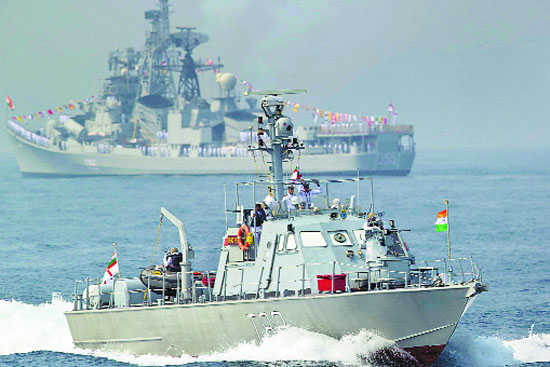
An indigenously built Extra Fast Attack Craft of the Indian navy in Visakhapatnam. PTI file photo
Abhijit Bhattacharyya Alumnus, NDC, & Member, Aeronautical Society of India: M.AeSI.
Abhijit Bhattacharyya
Alumnus, NDC, & Member, Aeronautical Society of India: M.AeSI.
Geopolitics and geo-strategy are followed by all sovereign states, focussing on the economics and defence of powers-that-be. But, the important thing is that landlocked states (those without access to a waterfront) are increasingly becoming serious on naval operations. Strange! A navy of landlocked states? Indeed! A majority of people may think that only those with access to sea could be naval powers. Can navy sail through land? No. But the thinking is dawning.
On a serious note, it be remembered that whereas all 222 nation-states (including the semi-independent territories, protectorates of the world) could be referred to as land powers, owing to their capability to deploy troops on land; there are only 160-odd nations, which are "water powers", with a minimum semblance of sailing assets. Surprising? No. Surprise has not dawned yet.
Surprise dawns on learning that of the 44 landlocked nation-states, some are serious to be a "sea power state". What makes landlocked states to look to sea, while some actual sea-states ignore the importance thereof? It's because of the geography. Compulsion of history. Aspiration of demography. Possibility of economics.
Historical naval powers
Thus, Germany has always been a strong power in heartland Europe for more than 100 years, with sea access. Yet, she could never be a serious maritime player either of/in Europe or beyond. Again, from Turkey in the eastern Mediterranean Sea to Italy in west-central Mediterranean, not a single state in the littoral could ever rise to be in world naval arena. History shows that Spain, Italy, the Dalmatian coastline principalities on the Adriatic Sea, Albania and Turkey, and to the south, Mediterranean's Tunisia, Algeria, Morocco, Libya, Egypt to Levant; all, at best, were local players of "landlocked Mediterranean Sea" and never beyond that. In fact, except the British Isles and the Royal Navy, not a single African, American, Asian, or Australasian state/power could sail and swamp the states of the world for almost 200 years, from the mid-18th to the mid-20th century.
Landlocked countries’ hardships
Therefore, only those without access to sea will understand the inherent hardship a nation faces in all fronts.
Azerbaijan, strictly speaking, is a landlocked state as its access to the main waterfront is the Caspian Sea which too is one of the few "landlocked seas" of the world. So, when the two — a landlocked land of Azerbaijan and landlocked Caspian Sea meet — what's the outcome? Azerbaijan goes to protect its offshore energy infrastructure, most of which is located in the Caspian waters. Importantly, the navy of landlocked Azerbaijan is being modernised; it has also inaugurated a shipbuilding facility.
Similarly, the landlocked state of Kazakhstan shoreline meets the "landlocked Caspian Sea" wherein the nascent navy of the former is being upgraded, to protect oil and gas fields, and to "fight terrorists". This is important. The navy of the virtually landlocked state of Kazakhstan is preparing to fight terrorists! Is Kazakhstan anticipating a sea-borne terror attack like what India faced on 26/11/2008? Planned and organised by Pakistan’s army-ISI?
The "navy" of the third Caspian Sea littoral state, Turkmenistan, too is being "upgraded". To "protect" the Caspian Sea-based oil and gas fields. In fact, the ambitious naval project modernisation of Turkmenistan goes beyond conventional defence to include, and provide, for itself anti-access/area denial capability to thwart any external maritime threat.
In Europe: At least three landlocked states are serious on the waterfront. Ever since the breakup of the Adriatic Sea shoreline of Yugoslavia into seven independent states, the overnight birth of landlocked Serbia transformed its former "Danube Flotilla" into "River Flotilla". Although the principal task of the Serbian Armed Forces revolves round its presence along the boundary with Kosovo, Serbia regularly conducts "live-fire and manoeuvre exercises" on the Danube and other rivers.
In Central Europe: Danube Flotilla is the only naval force serving landlocked Hungary too. Deployed to operate along 420 km of Danube, it regularly practices live-fire training and despite a modest budget, Hungary is stressing on patrol and interceptor craft augmentation.
Switzerland, the third landlocked state does not have navy; yet it operates a number of flat-bottomed raiding craft for border protection, search and rescue and maritime surveillance on its large lakes.
In South America: The landlocked Bolivian "Navy", known as "Armada Boliviana, is responsible for inland waterways, drug traffickers and internal security in charge of Bolivia's "maritime, riverine, lacustrine interests". It has navigable waterways of 35,000 km. Bolivia's desperation to break open, and access to sea is noteworthy. When it announced (November 2010) a plan to open its first Pacific Ocean coast base, near a Peruvian port, it was geo-economics. But now, the project is on hold owing to Congressional opposition in Peru.
Landlocked Paraguay, though 1000-km plus away from Atlantic Ocean, has an important 1,600-mile long river system affecting the nation's daily life. Understandably, Paraguay's naval force is larger than that of some maritime nations.
In Africa: The landlocked Uganda has no navy but it has to police its inland waters, especially since most of the large, Edward and Victoria lakes are shared with neighbouring nations.
(Views are personal)



























